Dudhwa National Park Festival Guide 2025 | Best Time, Safari & How to Visit
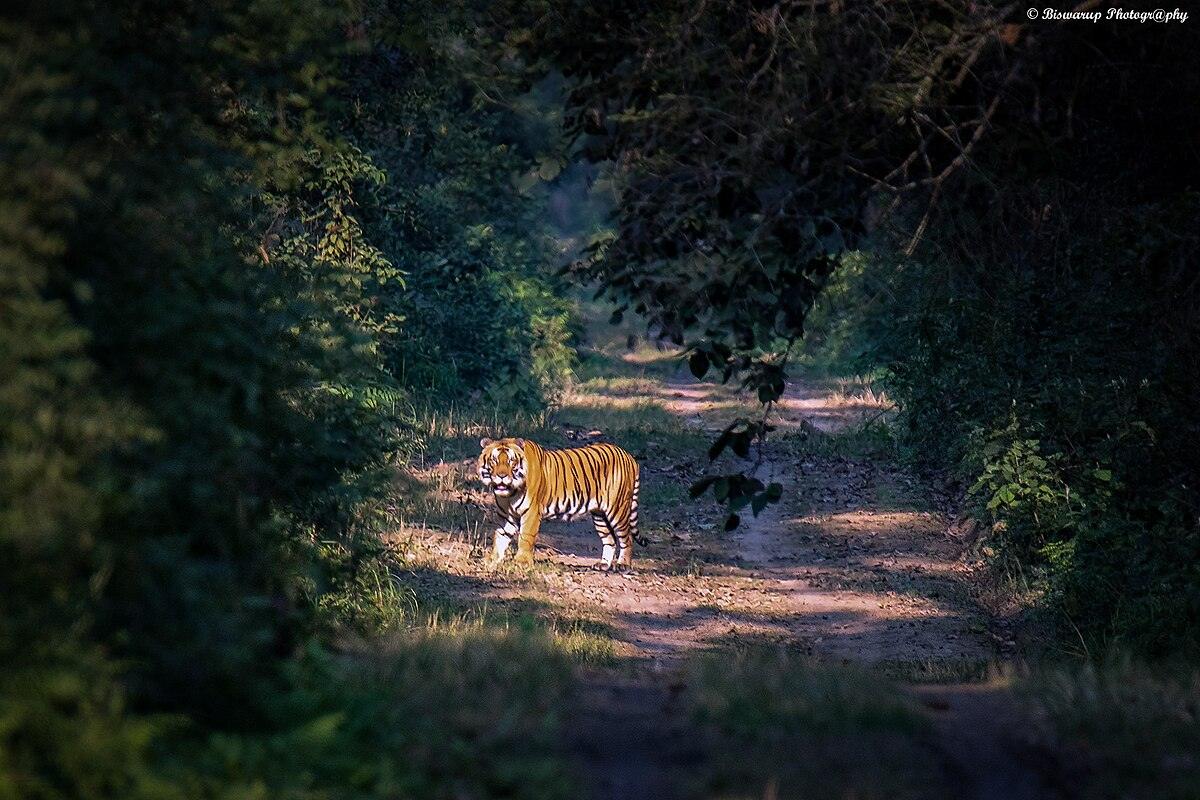
In November 2025, Uttar Pradesh is set to host its first-ever Dudhwa Mahotsav, a three-day celebration deep in the heart of Dudhwa National Park (also known as Dudhwa Tiger Reserve) in the Lakhimpur Kheri district. Organized by the Uttar Pradesh Eco‐Tourism Development Board, the festival is designed to highlight the region’s breathtaking biodiversity, the rich cultural heritage of the Tharu tribe, and the importance of conservation-led eco-tourism.
This isn’t just a wildlife event — it’s a holistic nature-cultural-meets-wellness festival, offering everything from safaris and jungle train rides to tribal storytelling, yoga in the woods, and eco-camps. The Mahotsav is being positioned as a flagship event: a celebration that merges sustainability with storytelling, biodiversity with business, and aims to place Dudhwa on the global eco-tourism map.
In this Blog
About Dudhwa National Park
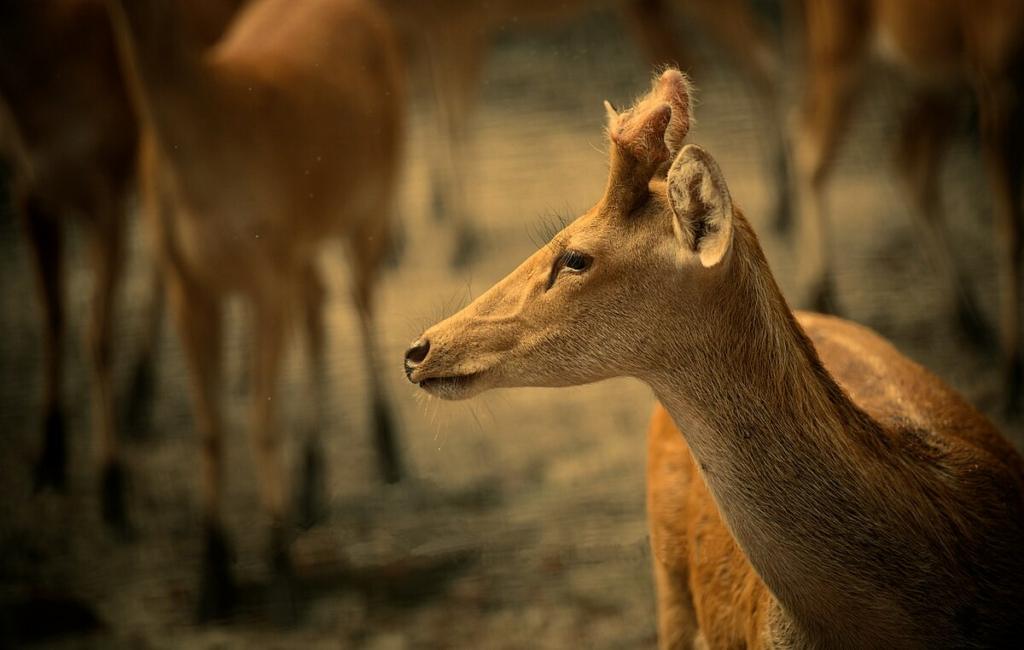
Before diving into the festival itself, it’s helpful to understand the setting — Dudhwa National Park is a gem of ecological diversity.
- Located in Lakhimpur Kheri, in the Terai belt of Uttar Pradesh.
- It covers hundreds of square kilometers of marshes, dense forests, grasslands, and wetlands.
- Wildlife: It is home to tigers, Indian one-horned rhinoceros, swamp deer (barasingha), elephants, and a variety of deer species, among others.
- Birdlife: Over 400 species of birds have been recorded here, making it a paradise for birdwatchers.
- Flora: It includes North Indian moist deciduous forest, with large tracts of Sal (Shorea robusta) trees, and extensive grasslands.
- Cultural connection: The region is inhabited by the Tharu tribe, whose culture is tightly intertwined with the forest and Terai lifestyle.
Dudhwa Mahotsav 2025 – The Festival
Dates and Theme
- The Mahotsav runs for three days in November 2025.
- According to news reports, the festival will take place from November 14 to 16, 2025 in the Dudhwa Tiger Reserve.
- The themes revolve around wildlife, tribal culture, wellness, and sustainable tourism.
Key Activities & Highlights
The Mahotsav brings together a variety of experiences aimed at both nature lovers and cultural explorers.
- Wildlife Safaris
- Guided jeep safaris into the core of the Dudhwa forest, offering the chance to see tigers, rhinos, elephants, deer, and other wildlife.
- Safari timings typically in the morning (7:00–10:00 AM) and evening (3:00–6:00 PM) according to park norms.
- Guided jeep safaris into the core of the Dudhwa forest, offering the chance to see tigers, rhinos, elephants, deer, and other wildlife.
- Vistadome Jungle Train Rides
- Special train rides through the forest in a Vistadome-style coach are planned, giving visitors panoramic forest views.
- Special train rides through the forest in a Vistadome-style coach are planned, giving visitors panoramic forest views.
- Adventure & Outdoor Activities
- Zip-lining, cycling trails, and wall climbing to bring in an element of adventure.
- Eco-camps: Visitors can stay in a “zero-waste tent city” that is inspired by forest aesthetics.
- Zip-lining, cycling trails, and wall climbing to bring in an element of adventure.
- Wellness & Forest Immersion
- Jungle yoga sessions, forest education workshops, and sessions with wildlife experts.
- Jungle yoga sessions, forest education workshops, and sessions with wildlife experts.
- Cultural Immersion
- Evenings will feature Tharu folk dances, music concerts, and cultural performances under the stars.
- Tharu craft exhibitions, tribal storytelling, and food stalls serving forest cuisine.
- Evenings will feature Tharu folk dances, music concerts, and cultural performances under the stars.
- Sustainability & Conservation
- Workshops on forest conservation, education sessions, and interactions with conservation experts.
- Platform to promote tribal handicrafts, forest produce, and climate-resilient livelihoods among the local Tharu communities.
- Workshops on forest conservation, education sessions, and interactions with conservation experts.
- Economic & Social Impact
- The festival aims to generate livelihood opportunities via local handicrafts, Tharu homestays, forest produce, and cultural experiences.
- Artists, eco-tour operators, and agencies from across India are being invited to participate, which could help boost the region’s tourism profile.
- The festival aims to generate livelihood opportunities via local handicrafts, Tharu homestays, forest produce, and cultural experiences.
Best Time to Visit Dudhwa National Park
Understanding the right season to visit is critical for planning, especially if you’re aligning your trip with the Mahotsav.
- Official Open Period
- Dudhwa Tiger Reserve is open to tourists from 15 November to 15 June each year.
- Safari timings: ~07:00–10:00 AM and ~03:00–06:00 PM.
- Dudhwa Tiger Reserve is open to tourists from 15 November to 15 June each year.
- Ideal Season
- November to April is considered the best time to visit.
- November to February (winter) is especially good for birdwatching: migratory birds, pleasant weather, lush landscapes.
- March to May (summer) is often ideal for wildlife spotting, as animals congregate around water sources; but daytime heat can be intense.
- November to April is considered the best time to visit.
- When the Park Is Closed
- From July to October, the park is typically closed due to monsoon rains, which make trails difficult and unsafe.
- The closure aligns with the breeding season of many species and helps protect the fragile ecosystem.
- From July to October, the park is typically closed due to monsoon rains, which make trails difficult and unsafe.
- 2025 Particulars
- In 2025, the Dudhwa Tiger Reserve reopened to tourists on November 1, earlier than its usual mid-November opening.
- The early reopening was welcomed by officials as a way to maximize the tourist season.
- In 2025, the Dudhwa Tiger Reserve reopened to tourists on November 1, earlier than its usual mid-November opening.
How to Visit: Getting There & Logistics

Here’s a breakdown of how to plan your trip to Dudhwa National Park and how to make the most of the Mahotsav.
How to Reach Dudhwa National Park
- By Air:
- The nearest major airport is in Lucknow. From there, you’ll need to travel by road to reach Dudhwa.
- Smaller airstrips or charter services may also be available for more direct access closer to the park — worth exploring with eco-tourism operators.
- The nearest major airport is in Lucknow. From there, you’ll need to travel by road to reach Dudhwa.
- By Rail:
- There are smaller branch-line rail connections serving the region around Dudhwa, enabling train travel closer to the park.
- From the railhead, you will need to arrange road transport to reach camps or safari entry points.
- There are smaller branch-line rail connections serving the region around Dudhwa, enabling train travel closer to the park.
- By Road:
- Road travel is common for visitors coming from Lucknow or other nearby cities.
- Private vehicles, taxis, or eco-tourism operators often arrange pick-up and drop-off.
- Road travel is common for visitors coming from Lucknow or other nearby cities.
Accommodation Options
Given that the Mahotsav is designed to be more than just day visits, lodging is a key part of the experience.
- Zero-Waste Tent City
- The festival will feature a tent city designed to be eco-friendly, minimizing waste and embracing forest aesthetics.
- These will likely have different categories (comfort levels) to cater to different types of visitors.
- The festival will feature a tent city designed to be eco-friendly, minimizing waste and embracing forest aesthetics.
- Homestays with Tharu Families
- For a deeply immersive cultural experience, participants can stay with local Tharu families.
- This is also an opportunity to engage closely with local traditions, food, and lifestyle.
- For a deeply immersive cultural experience, participants can stay with local Tharu families.
- Eco-Lodges / Camps Outside Festival
- Beyond the Mahotsav, Dudhwa has eco-lodges and camps that cater to sustainable tourism.
- For a multi-day wildlife trip or safari-focused visit, these accommodations provide both comfort and proximity.
- Beyond the Mahotsav, Dudhwa has eco-lodges and camps that cater to sustainable tourism.
- Cosy Villas
Mud Mirage
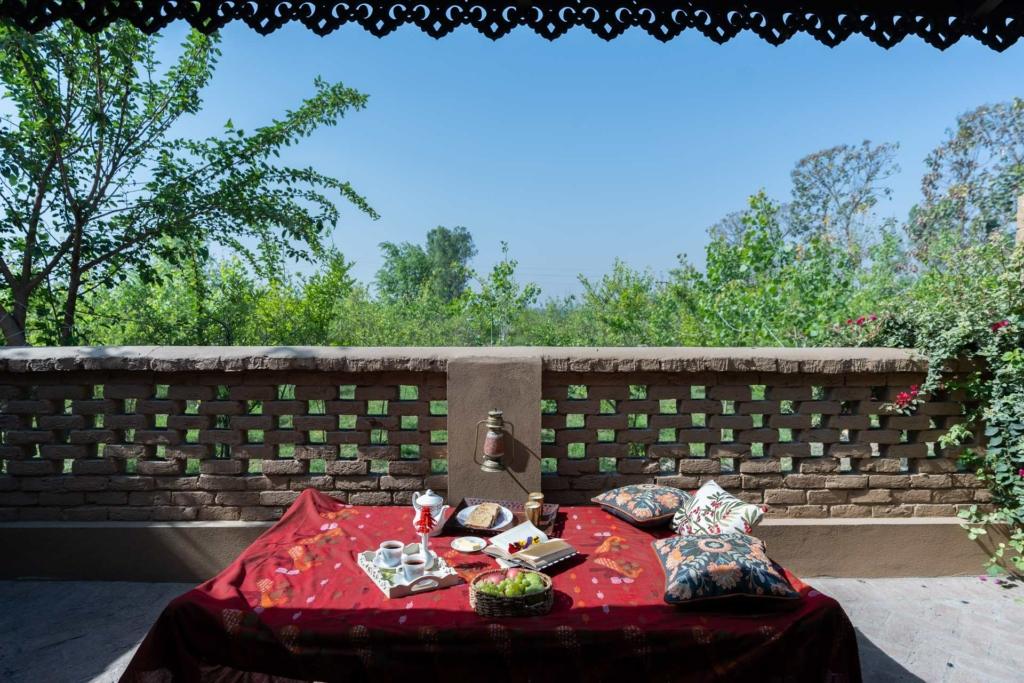
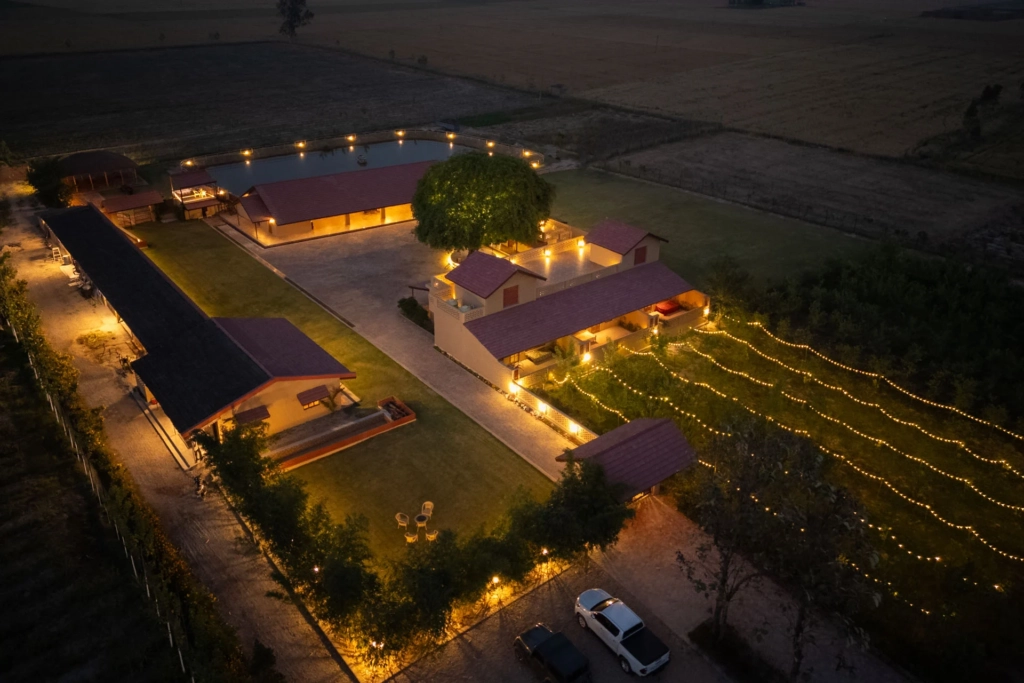
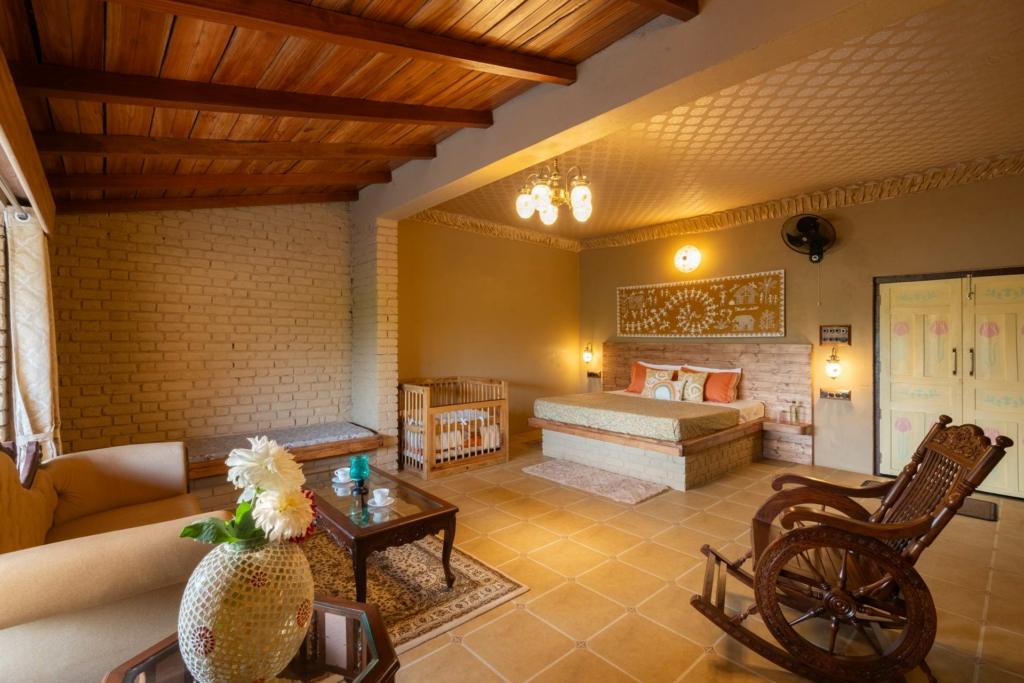
Neervana



Permits & Safari Booking
- Since Dudhwa is a protected reserve, permits are required to enter on safari.
- Book early: Given that the Mahotsav is a major event, advance booking of safaris, train rides, and camps is strongly recommended.
- Safari types: Options typically include jeep (4WD) safaris. Some private operators may also offer walking or elephant safaris, but jeep is the most common.
- Respect all rules: Visitors must stick to trails, avoid loud noises, and not disturb wildlife — guidelines laid out by park authorities should be followed strictly.
What to Expect & Tips for Festival Goers
Here are some practical tips, plus what you can reasonably expect when attending the Mahotsav and exploring Dudhwa.
- Pack Smart
- Clothing: Layered clothing is ideal — warm clothes for early mornings and evenings (especially November), and lighter clothes for warmer daytime.
- Footwear: Comfortable walking shoes for forest trails and uneven terrain.
- Gear: Binoculars, a good camera, insect repellent, hat, sunscreen, and a reusable water bottle.
- Clothing: Layered clothing is ideal — warm clothes for early mornings and evenings (especially November), and lighter clothes for warmer daytime.
- Health & Safety
- Carry basic first-aid, especially for insect bites or mild scrapes.
- Travel insurance: Consider one that covers wildlife or remote-area travel.
- Hydration: Stay hydrated, as forest climate and safari activity can be tiring.
- Follow guide instructions: On safaris or in camps, always follow the guidance of trained forest guides to stay safe and minimize disturbance to wildlife.
- Carry basic first-aid, especially for insect bites or mild scrapes.
- Cultural Sensitivity
- When interacting with the Tharu community, approach with respect: photography, asking permission, and understanding cultural norms matter.
- Support local handicrafts: The festival features Tharu craft exhibitions — purchasing locally helps the community directly.
- Zero-waste ethos: Be conscious of waste. Use reusable items, dispose of trash responsibly, and minimize your environmental footprint.
- When interacting with the Tharu community, approach with respect: photography, asking permission, and understanding cultural norms matter.
- Maximizing Wildlife Sightings
- Hit safaris during early morning or late afternoon: wildlife is more active, and lighting is better for photography.
- Birdwatching: If you’re a bird lover, carry a field guide; November is especially good because migratory birds are around.
- Be patient: Wildlife sightings depend on luck, timing, and habitat — calm observation often pays off.
- Hit safaris during early morning or late afternoon: wildlife is more active, and lighting is better for photography.
- Engage in the Festival
- Attend workshops: The Mahotsav offers forest education, storytelling, and conservation workshops.
- Join yoga or wellness sessions: Forest yoga is a part of the programming, bringing a unique way to connect with nature.
- Enjoy cultural performance nights: Tharu dance, music, and storytelling under the stars will be one of the highlight experiences.
- Attend workshops: The Mahotsav offers forest education, storytelling, and conservation workshops.
Conservation & Community Impact
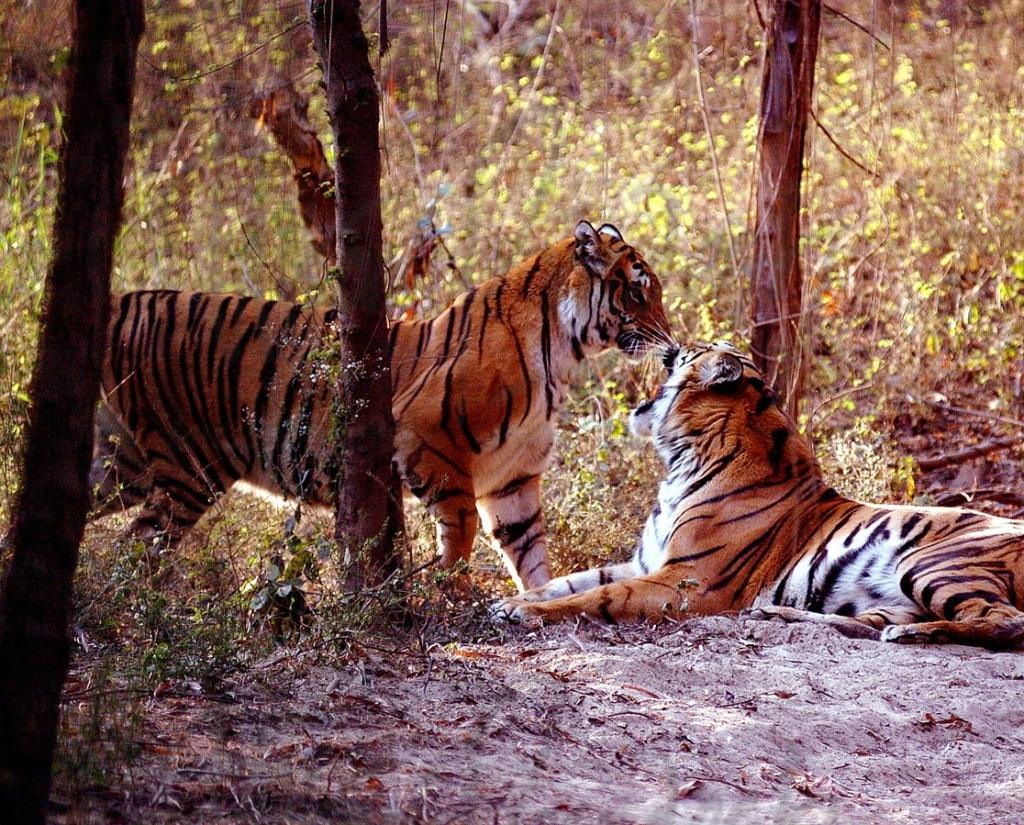
The Dudhwa Mahotsav is more than just tourism — it’s a concerted effort to build a sustainable, community-driven eco-tourism model. Here’s how:
- Empowerment of Local Communities
- By involving the Tharu tribe in cultural performances, handicraft stalls, homestays, and cuisine, the festival provides a platform for livelihood generation.
- Conversations with forest stakeholders and eco-tour operators ensure that local voices shape the tourism model.
- By involving the Tharu tribe in cultural performances, handicraft stalls, homestays, and cuisine, the festival provides a platform for livelihood generation.
- Sustainability Focus
- The zero-waste tent city underscores the environmental commitment: minimizing plastic, waste, and ecological footprint.
- The event could act as a blueprint for forest-compatible tourism, promoting business that benefits both nature and local communities.
- The zero-waste tent city underscores the environmental commitment: minimizing plastic, waste, and ecological footprint.
- Education & Conservation Awareness
- Workshops and forest education sessions help raise awareness about conservation, wildlife protection, and ecological balance.
- Interactions with wildlife experts and conservationists during the Mahotsav can increase public understanding of the challenges faced by Dudhwa’s ecosystems.
- Workshops and forest education sessions help raise awareness about conservation, wildlife protection, and ecological balance.
- Tourism Branding & Long-Term Vision
- For Uttar Pradesh Tourism, the Mahotsav is a strategic move to position Dudhwa as a world-class eco-tourism destination.
- The festival is not only about footfall; it’s about responsible tourism, where growth does not come at the cost of ecological degradation.
- For Uttar Pradesh Tourism, the Mahotsav is a strategic move to position Dudhwa as a world-class eco-tourism destination.
Why the Dudhwa Mahotsav 2025 Matters

- Unique Nature-Cultural Blend: There are few festivals in India that so deeply integrate wildlife, tribal heritage, eco-sports, and wellness. Dudhwa Mahotsav stands out for its holistic approach.
- Eco-Tourism Innovation: The zero-waste city, forest education, and role of local communities make this a potential model for eco-sensitive tourism in other reserves.
- Global Positioning: This Mahotsav could help put Dudhwa on the international ecotourism map — highlighting its biodiversity, conservation importance, and cultural richness.
- Economic and Social Impact: Beyond tourism, the festival has a real potential to boost livelihoods, preserve tribal heritage, and invest in sustainable development.
- Conservation Awareness: Festivals that combine celebration with conservation messaging often leave a more lasting impact — attendees may become advocates for Dudhwa and its ecosystem.
Tips for Planning Ahead
- Book Early: Given the novelty and limited capacity, secure safari slots, tent stay, or homestay well in advance.
- Go Through Official Channels: Use the UP Eco-Tourism Development Board website or authorized operators to avoid unauthorized operators.
- Travel Light but Prepared: Bring eco-friendly gear, reusable water bottles, and a camera/binoculars.
- Be Respectful: Respect local customs, avoid loud behavior in camps, and follow forest rules.
- Stay Flexible: Wildlife sightings are not guaranteed. Be open to changes in schedule or timings.
A Wilderness Celebration Worth Experiencing
The Dudhwa Mahotsav 2025 is a landmark moment for wildlife tourism in Uttar Pradesh. By combining conservation, tribal culture, and eco-friendly tourism, the festival promises to be more than just a travel event – it’s a movement toward sustainable tourism rooted in nature and community.
For travelers, this is a rare opportunity to experience the Terai jungles in their raw beauty, to stay in eco-camps, to learn about the Tharu traditions, and to witness wildlife in a way that is respectful and intentional.
If you’re planning a trip, aligning your visit with the Mahotsav offers both the spectacle of a festival and the serenity of the forest – a blend that’s hard to find anywhere else.
Banner Image Credit: Biswarup11via Unsplash





